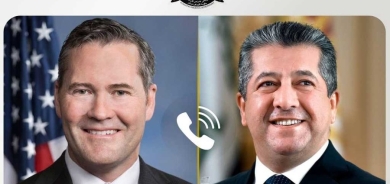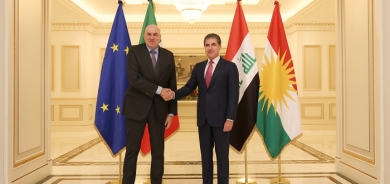Mushtaq Khan to Gulan Magazine:-The development and rebuilding processes are extremely important; you cannot have transition without development
March 17, 2012
Exclusive Interviews

Mushtaq Khan is Professor of Economics at London University, member at the Centre of South Asian Studies, and member at Centre for Palestine Studies (CPS). We contacted the Professor Khan to discuss the importance of transition, democracy, reforms, and development, and he replied to our questions in an exclusive interview to Gulan Magazine as the following:1- Every process of the transitional phase is so much related to the development and management of the infrastructure of institutions, so rebuilding and development processes are essential factors to let the transitional phase succeed. So, according to your opinion; to what extend development and rebuilding processes are important for the transitional phase of the developing countries?
Prof. M. Khan:- The development and rebuilding processes are extremely important, you cannot have transition without development in my understanding, because the sustainability of institutions and the sustainability of political stability requires you to have a broad based economic development, and requires you to have a broad based creation of employment opportunities, jobs and growth. The transitional will not be sustainable if you don't have these processes of economic development as part of the process of the transition itself.
2- Democracy process is at early phase in the developing countries and the freedoms should be managed within the frame work of law. So, in your view; to what extend attempts for sovereignty of rule of law and independency of judiciary is necessary for democracy development process? And, to what extend sovereignty of rule of law is the first station to the success of democracy development process?
Prof. M. Khan:- This is a very big question and different people take different positions on it, I think that as I understand it my reading of history is that these two things develop side by side in parallel. And both of them are dependent on the achievement on broad based economic development, I think to say that the rule of law is important no one can disagree with it, the problem is ''how do you enforce the rule of law in a context where you have very limited resources where there are powerful informal organizations in your society, and there are powerful groups who are operating outside the rule of law'', so rule of law is not just a statement, rule of law actually describes substantial level of economic development because you must have institutions which can enforce the rules and you must have a broad understanding and agreement in society that these are the rules which everybody and most people agree to have. So, the rule of law takes a long time to evolve, you must have a social consensus and it is only possible when most of the people are happy and most people are likely to be happy if there is economic prosperity, to achieve the rule of law in the absence of that is very difficult. So, to say that rule of law comes first, then comes democracy, and the development is I think not feasible, it might be in theory ok, but in practice it is completely not feasible. So, in my view all of these things have to develop simultaneously, but the most important thing that needs to happen is economic development, because if you don't have economic development, you will have neither the resources to have rule of law nor the resources to run a democracy. And both rule of law and democracy require resources, if you don't have resources you cannot run a democracy or rule of law.
4- Usually in these societies the political parties face problems with each other which lead to the creation of tension between political parties. So the real question is; how political parties can get to use to resolve their problems between each other through dialogue instead of tension?
Prof. M. Khan:- You're asking the most important question because the heart of economic development and the heart of democracy and the rule of law is the organization of political parties, this is if you ask me what is the most important task, I would say this is the most important task: is to construct not just the political parties but a broad popular pressure on the political parties to behave in reasonable ways and this is not easy to achieve because Iraq is not the only country which has the problem here, most developing countries have political parties which are not very realistic and do not want to make compromises, they want to capture all the resources for themselves and this results in social tension and crises and so on. So, how do you construct political movements and political organizations which are willing to make compromises for the national development which are able to govern reasonably, is I think much more important than rule of law or of democracy, this is the fundamental job. And here I think organizations which are in the media and academia and think tanks, public places and civil society, we all have to speak together to explain to the political parties that this is their responsibility that if they try to destroy their opposition or to try to destroy people who disagree with them, the effect will be disasters for them and for the country and I think that this is so obvious but people don't really understand this because one of the problems of development is that people are very hungry and people who have political power are very hungry and want to capture a lot of resources for themselves and in trying to capture all the resources for themselves they try to destroy other interests and other groups in site, this is the fundamental problem, and you can't solve this with a rule of law because rule of law itself is difficult to be enforced, so you have to solve it with understanding with popular pressure, with discussions, with media saying these, with civil society saying it and with everybody have to keep on saying that no political party should try exterminate or destroy its enemies, because this is a road to disaster, everybody has to learn to live and let live to share and to make compromises in the national interest, this is the most fundamental job.
6- Corruption is not a special event to the developing countries, but it leads to collapse of institutions and darkens the future of the country. So, how is it possible to combat corruption in the developing countries and to change what aids the corruption into aiding anti-corruption process?
Prof. M. Khan:- Corruption is one of the problems which takes many years to address, because one of the main causes of corruption is that when you don't have enough resources in the budget to redistribute, then a lot of corruption is political corruption, people who are powerful are capturing resources, because the only way they can get resources is outside the budget, and when you capture something outside the budget is corruption. So developing countries have a lot of corruption because their politics does not go towards democratic process of the budget, and this takes a long time to resolve, now again if you want to get rid of corruption tomorrow, you will fail just like if you want to have good rule of law tomorrow you will fail. But in the same way you have to keep on making slow and gradual progress in getting rid of the most damaging types of corruption, the corruption that destroys the political fabric of the country, the corruption that results in the resources been taken out of the country and put in Swiss banks, the corruption that results in infrastructure not been built, you have target specific areas that corruption has very damaging effects, but to say that we will get rid of all corruption is not very useful, because you cannot succeed, so just like what we are saying about politics; anti-corruption is very important if you take it in a very specific targeted step by step get rid of corruption in the most damaging areas. Iraq needs to build infrastructure, Iraq needs to have political compromises between its political parties, those kinds of things should be the more transparent this it is the more consensuses this it is, the better it is. But that there will be no corruption in the Iraqi political parties, that there will be no secret deals within them, this is impossible. And we should not be trying to get rid of all of that. So I think the program of governance must be pragmatic, must be implemental and must be step by step and most fundamentally it must give up the idea that anyone ethnic group or regional group has the right to control and command the other groups it has to be based on a compromise that is the only way forward.
7- In the developing countries the ratio of the young people among the population is quiet high, and young people usually thinks radically and toughly. So, how the government of the developing countries can respond to the demands of the young people and to benefit from their energy at the same time?
Prof. M. Khan:- Having young population is a challenge because the big challenge for the developing countries is to create jobs and job creation is not easy, you have to have some kind technology policy and industrial policy to acquire new technologies and create a lot of jobs. If you can't create jobs then you see most people think of young people as innovators as creating new inventions and so on, yes small minority of people will do that, but most young people will not be innovators, will not be inventors, they need jobs. So, developing countries need to create tens of millions of jobs and this requires a mass manufacturing strategy, industrial strategy, to create jobs for tens of thousands and thousands of people, and lack of that kind of industrial policy in that country is a big challenge, and if the challenge cannot be met, then you will have political instability, you will have aspiration crisis, you know the problems that you will have, and the answer is to create jobs.
Transcript: Sheban Ferhad















